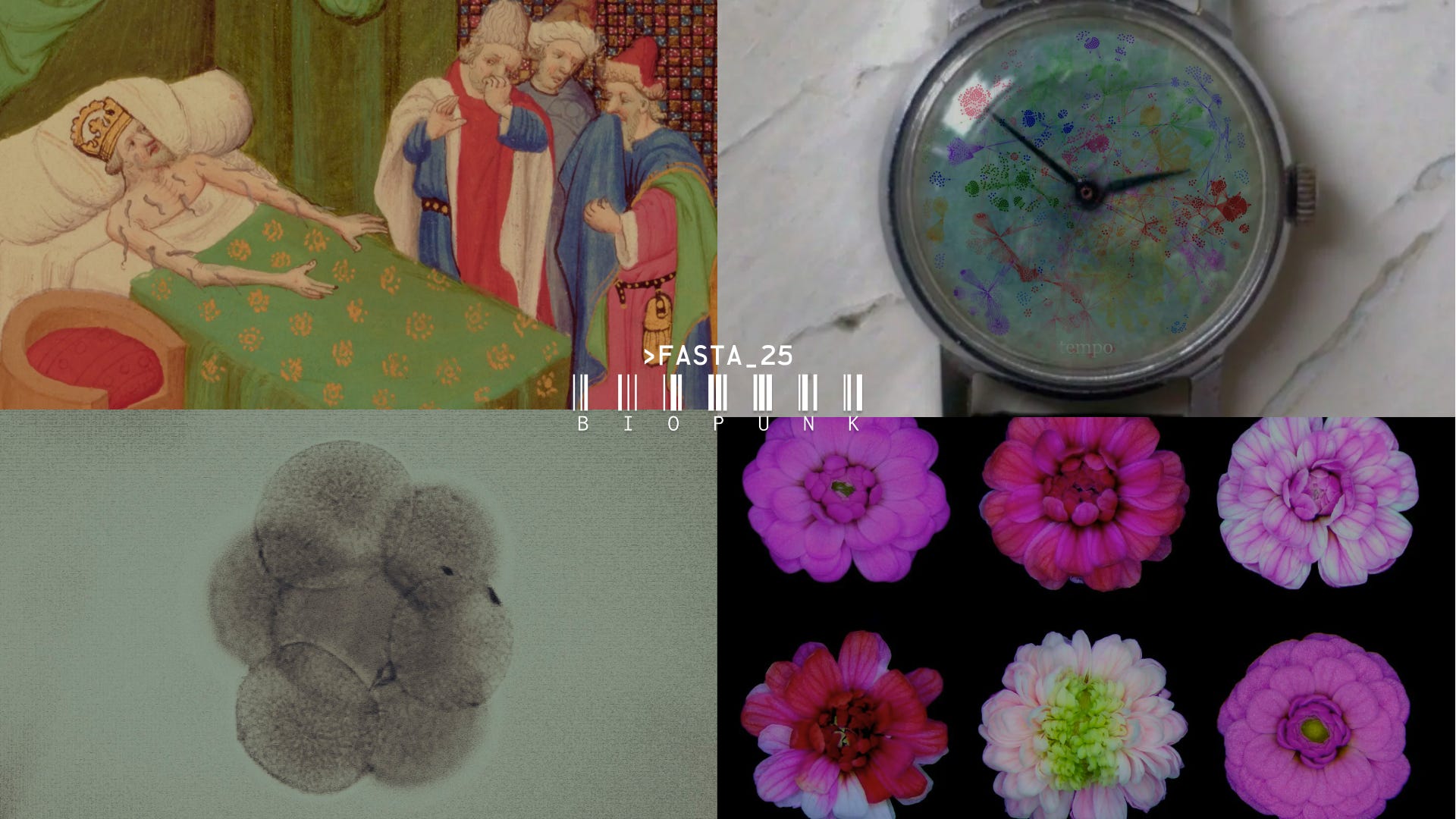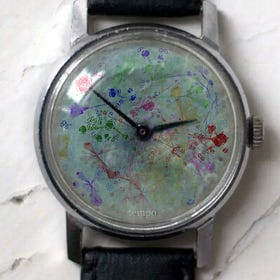>FASTA_25
To become God or to create God; Olden Labs; Gameto’s ovary platform; NFX x women's health; $20M for skinspan; From tennis to cosmetics; Folk medicine; 1000 designer flowers; Tempo the biological watch
>FASTA: weekly short reads of the global biotech ecosystem | Papers and patents, acquisitions and bankruptcies, biotech philosophy | Read in under 5 min | Follow on LinkedIn, X, YouTube, and Instagram! | Versión en Español
Pilgrim is proud to sponsor >FASTA! We’re developing the next generation of military medicine to meet the operational demands of modern warfare—moving beyond theory and bringing biotechnology from the benchtop to the battlefield.
1/9: To become God or to create God
Humans use AI to select which genes to edit in all kinds of organisms, from plants to humans. We grant them control of cloud automated labs where these organisms are born from artificial wombs — In such dystopian world, we don’t become Gods; AI does.
2 out of every 100 American babies are conceived through IVF already. What most people don’t think about is that the sperm IVF selects for is different because they’re not traveling the same distance as in the fallopian tube. A 2019 study suggests that ICSI-conceived men may have impaired sperm production — Does this mean we will IVF ourselves out of existence?
🎙️ Biofounders episode with Michael Florea, cofounder & CEO of Olden Labs
2/9: AI-smart and low-cost animal cages
While the news says that organoids and simulations are making animal testing obsolete, that still seems far from reality in practice. Anywhere where you have multisystem interactions, you need a whole organism. Organoids and chips are expensive to maintain, and full organism modeling is still decades away.
Olden Labs builds AI-smart and low-cost cages with built-in cameras, microphones, wifi, and an AI-powered data platform so you know what your mice are doing all the time, at scale. In the first month of launching, they secured over 100 labs, companies, and institutions to sign up for their cages and they’ve already shipped over 40 Domes starting at $1,000 each.
3/9: Gameto’s $44M Series C
Instead of hormone-pilling women to extract their eggs (causing undesired side effects), Gameto has engineered in-vitro maturation organoids from iPSCs to mature eggs outside the body. These ovaries in a dish reduce the protocol from 2 weeks to 2-3 days. Their product is already available in Mexico, Peru, and Australia, and is at the last phase of clinical trials in the US.
It’s interesting how the company is taking a platform approach, such that the same organoids they use to mature eggs can also be used to develop cell therapies that slow down menopause. They have already received $10M from the Advanced Research Projects Agency for Health (ARPA-H) for this research.
4/9: NFX investing in Women’s Health
The renowned VC fund is calling for startups in women’s health. Not only fertility companies, or drugs for conditions that affect women exclusively. Osteoporosis, Alzheimer’s, and heart disease — just to name a few — are conditions that women are more likely to suffer from, “and cost us all billions of dollars”.
Some sources they cite: 80% of surgical studies specifying sex have male-only subjects. In neuroscience, there are five studies on men for every one conducted on women. In cardiovascular research, women account for just 38% of participants in clinical trials, even though heart disease is the leading cause of death for women globally, more than all cancers combined.
Well, it’s great that investors are finally realizing the great gap and “opportunity” in this space. A young and naïve woman thinks it’s partially insulting that these issues are only brought up in the context of capital, and not values such as justice.
5/9: From tennis to cosmetics
The company reports a 23x yoy growth in revenue for Q2 in their Vegan Silk Technology Platform. Their customer, Goddess Maintenance Company, launched their Biotech Blowout Restorative Leave-in Hair Mask, and they’ve secured a partnership with a major beauty conglomerate.
After pausing operations for their mycelium-based material, — which engaged with Stella McCartney, Adidas, and Kering — Bolt has placed full focus on b-silk, a fermented silk alternative to silicone elastomers that are commonly used in beauty products, but also under increasing regulatory and consumer scrutiny due to concerns about their impact on human health and the environment.
6/9: $20M for OneSkin’s skinspan products
Oneskin’s face, body, and eye peptides reduce the accumulation of senescent cells to reduce inflammation, collagen breakdown, and visible signs of aging. Katy Perry is among their fans, and Unilever among their investors.
I’ve said it before and I’ll say it again: peptides are reawakening consumer bio. They’ve come for your gut, your hair, and now they are coming for your skin too.
7/9: Leeches and the Legitimizing of Folk-Medicine
Leeches are worms that can draw contaminated blood from the body and inject anti-inflammatory and anticoagulant molecules. Napoleon Bonaparte used them to treat his hemorrhoids, and they were FDA-approved as a medical instrument in 2004. In the UK, initial consultation can cost £195 and follow-up sessions £175.
There would be no CRISPR if weird scientists hadn’t got grants to study weird and unsexy bacteria. For biotech to advance, we need to keep going to the punk corners of the tree of life. The spiritual past of any potential solution, like leeches, should not be a reason to deem them as “unscientific”.
8/9: 1,000 Flowers by Nick Desnoyer
Nick Desnoyer’s genetically designed flowers are not only unique, but also meaningful. Inspired by the Japanese legend of a girl in Hiroshima who created 1,000 origami paper cranes for good fortune, Nick is set out to design and create 1,000 flowers.
This week, for the love of art, Nick gave away 100 t-shirts with photographs of some of the flowers he’s created so far — It’s not often I find someone who is doing truly poetic biotechnology. I’m glad to call him a friend and have interviewed him on Biofounders.
Poets
9/9: Tempo, the biological watch
Today’s clocks are essentially oscillators of a highly regular physical process, like the vibration of a quartz crystal or the oscillation of a pendulum. Oscillators are also present in circadian clocks, heartbeats, and neural rhythms that regulate biological cycles. Time has always directed how organisms age and evolve.
Today’s quantified self movement has spurred all kinds of devices to measure such cycles — REM-measuring rings, epigenetic clock tests, hormone testing devices — often aided by AI for interpretation and forecasting.
We, biology, have outsourced introspection to machines that tell us how rested, young, or even happy we are. Instead of looking at our analogous biology itself, we look at digital numbers on a screen.
Tired of this enslaving approach, a rebellious biological watchmaker decides to bring biological time somewhere it can be seen as it is. The biological watch contains engineered cells from the user to project visible signals at every passing unit of biological time.
The International System of Units (SI) defined the second as the duration of 9,192,631,770 cycles of the radiation of the cesium-133 atom, which quartz watches approximate.
The biological watch, instead, ticks at the cell’s own tempo. A neuron, an egg, gut bacteria, a stem cell, all tell a different story, as they age. Unlike the silent ticking of a digital clock, the biological watch reminds the user of two deep truths about life: entropy and finitude.
Naturally, biologizing time means not only to make a strap out of mycelium. It is to understand, imbue with, and remind the user of what it means to be alive, including decay. It is an instrument for introspection.
Tempo, the biological watch
Todays’ clocks are essentially oscillators of a highly regular physical process, like the vibration of a quartz crystal or the oscillation of a pendulum. But oscillators are also present in circadian clocks, heartbeats, and neural rhythms that regulate biological cycles. Time is has always directed how organisms age and evolve.





